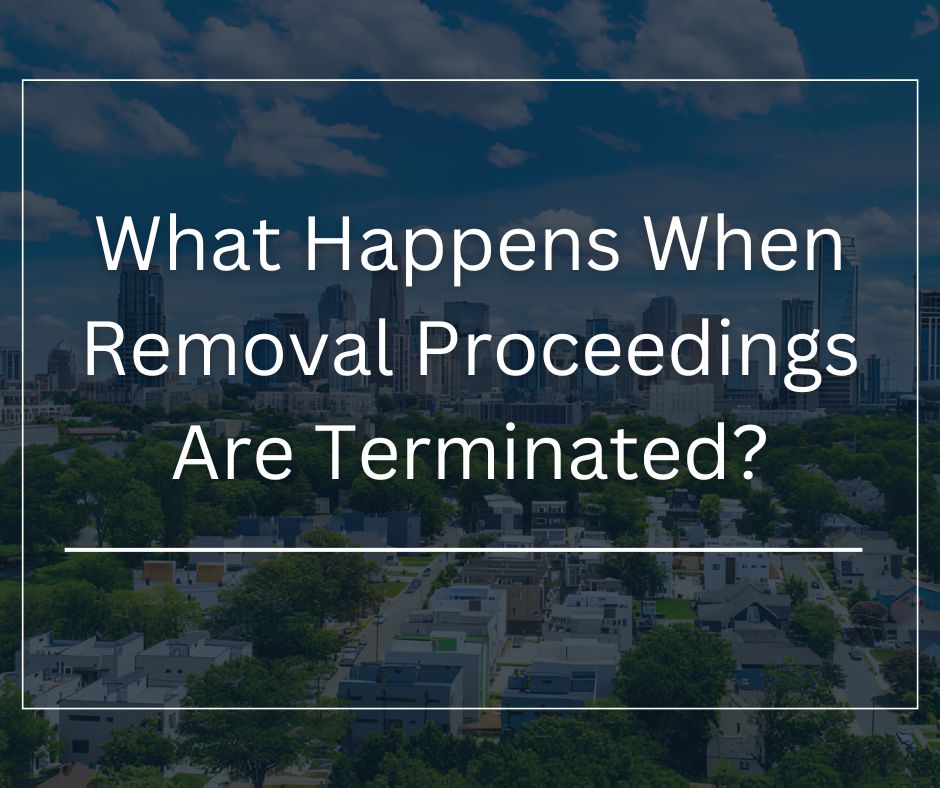
Being placed in removal or deportation proceedings can feel like staring down the total upheaval of your life. However, the immigration court judge can terminate the proceedings against you without deporting you. With your removal proceedings terminated, what next?
Your next step depends on the reasons for termination, like:
- You obtain a green card or another legal status;
- The government drops its case; or
- The government refiles its case.
If you are facing immigration court proceedings, contact Elliot, Morgan, Parsonage at (336) 724-2828. We can help you explore your options to terminate or defend against the charges. Our background in criminal and immigration (“crimmigration”) law means we represent noncitizens regardless of criminal history.
What Are the Steps of the Removal Process?
Immigration court proceedings begin when the Department of Homeland Security (DHS) serves a Notice to Appear (NTA). The NTA should schedule a hearing and inform you that DHS has decided you are removable and on what basis.
After you receive the NTA, you have to attend a master calendar hearing (MCH) before an immigration judge (IJ). At the MCH, you respond to the government’s allegations, state what you expect to claim, and set a date for an individual hearing.
At the individual hearing, you and a DHS attorney present your cases. Then, the IJ determines whether to order you deported or removed.
Sometimes, you can appeal an adverse IJ decision. You can appeal to the Board of Immigration Appeals (BIA) and potentially to a federal circuit court or, rarely, the US Supreme Court.
How Do Removal Proceedings End?
There are several ways a case can end, though not all qualify as termination of removal proceedings:
- The IJ reaches a final decision;
- The IJ dismisses your case; or
- You voluntarily depart the United States.
Although not an actual end to the case, an IJ can also administratively close your case.
Final Decision
When an IJ reaches a decision, they order you deported or grant relief. The decision becomes final when you waive appeal.
Dismissal
You can move to dismiss a case for several reasons, based on the law or procedural issues. DHS attorneys may also ask to dismiss the case.
Voluntary Departure
If you receive an NTA, you can sometimes choose to depart voluntarily. Voluntary departure minimizes some of the consequences of deportation, but you still cannot typically return to the US for many years.
Administrative Closure
Non-citizens might have a path to valid legal status that only another agency, usually United States Citizenship and Immigration Services (USCIS), can grant. You can generally request an IJ administratively close your case if you have an application pending with USCIS.
Administrative closure pauses your case, taking it off the IJ’s calendar. Usually, you administratively reopen the case after USCIS responds to your request.
When Can an Immigration Judge Terminate Proceedings?
Under the law, proceedings can be terminated when:
- You depart the United States;
- The IJ or DHS concludes you are not inadmissible or deportable;
- The NTA is canceled; or
- An IJ or the BIA terminates them.
Some of these options are more permanent than others.
You Are Not Inadmissible or Deportable
DHS is trying to prove you are inadmissible or deportable when it opens proceedings against you. Generally, you become inadmissible or deportable by violating the terms of your lawful status, being convicted of certain crimes, or entering the country without documentation. Some of these grounds can be waived, depending on severity.
The NTA Is Canceled
Your NTA may be canceled for several reasons:
- You are a US citizen;
- You are not deportable or inadmissible;
- You are deceased;
- You are not in the United States;
- The NTA should not have been issued or has procedural issues; or
- Deportation or removal is no longer in the government’s best interests.
If the NTA is canceled, the present proceedings against you end.
The IJ or BIA Terminate the Case
Often, the IJ or BIA will terminate the case when they grant you lawful status like asylum or withholding of removal. They may also terminate a case if you obtain legal status under an alternative process, like through USCIS. This frequently involves temporary administrative closure.
What Happens When an Immigration Judge Terminates Removal Proceedings?
With removal proceedings terminated, what next? The answer depends on the reason for the termination.
If your removal proceedings terminated because you were granted alternative status, you usually continue working with USCIS and can stay in the United States.
If your NTA was canceled, the power is often in DHS’s hands. NTA cancellation is “without prejudice.” This means DHS can reissue an NTA if you still qualify for removal. But it may choose not to if you convince it you are not a deportation priority.
How Can an Immigration Attorney Help?
Facing immigration court alone leaves you at an enormous disadvantage. We can help you evaluate your options, prepare for what to expect, design legal strategies, and, crucially, help lower your stress levels. Reach out to Elliot, Morgan, Parsonage at (336) 724-2828 today to speak with our compassionate, experienced immigration law practitioners.
